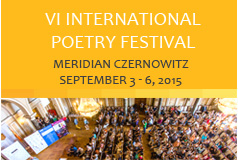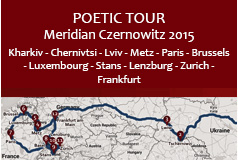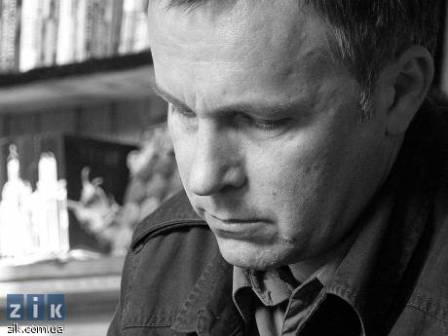Tomasz Różycki was born in Opole, Upper Silesia in 1970. He was already singled out for his poetry at school, with an early poem was published in the journal “Polska Miedź”. Różycki studied Romance Languages at the Jagiellonian University in Cracow. He then worked as a French teacher at the Foreign Languages Teaching College in his native city. Alongside his work he translated poetry from French, publishing a translation of Stéphane Mallarmé’s “Un coup de dés jamais n’abolira le hasard” in 2005.
However, it was through his own poems that Różycki became well-known, and he has published six volumes of poems to date. His texts have appeared in the leading cultural magazines and literary journals such as “Czas Kultury”, “Odra” and “Studium” as well as in Bulgarian, Lithuanian, Ukrainian and German poetry anthologies. They have been translated into eight different languages.
He made his literary début in 1997 with a collection of poems entitled “Vaterland” (tr: Home country) which was shortly followed by the collections “Anima” (1999), “Chata umaita” (2001) and “Świat i Antyświat” (2003; tr: World and Antiworld), containing formally tight poems of hermetic content which combine cultural allusions with concrete descriptions.
In 2004 Różycki received the Prize of Geneva’s Koscielski Foundation for his poem “Dwanaście stacji” (2004; tr: Twelve Stations) and thus joined the ranks of Poland’s most important writers, among them Sławomir Mrożek, Zbigniew Herbert and Adam Zagajewski. In the same year a collection of Różycki’s first three volumes appeared under the title “Wiersze” (2004; tr: Poems). His latest work, “Kolonie” (2006), brings together seventy-seven poems whose exotic titles such as “Ziemia Ognista” (tr: Fire earth) and “Cynamon i goźdiki” (tr: Cinnamon and cloves) present a striking contrast to the depictions of everyday Polish country life and the melancholic thoughts they contain.
Różycki, who has been awarded the Krzysztof Kamil Baczyński Prize and been nominated for Poland’s most important literary award, the Nike Prize, lives in his native city with his wife and two children.











